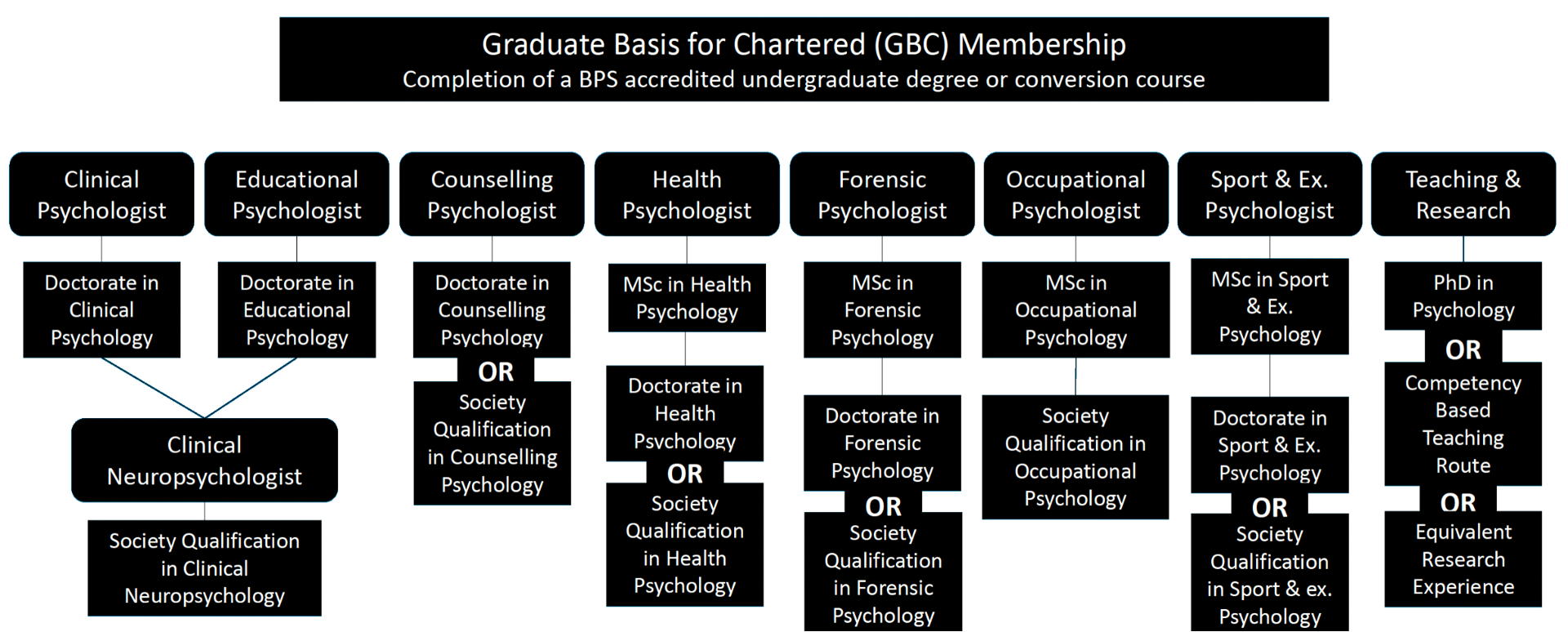|
Being a Registered Psychologist such a rewarding career path, with so many options of areas you can specialise in; from Clinical, Health, Occupational, Counselling and many more. Becoming a Registered Psychologist does however take time and dedication to the particular field you wish to specialise in. Out of university, an accredited BSc Hons Degree means you can register for the Graduate Basis for Chartered Membership (GBC) which also means you can continue on your studies on to an accredited Masters, or Doctoral Programme. From there you are able to study a number of qualifying MSc courses that lead you down the path to your specialised profession. Health Psychology, Forensic Psychology, Occupational Psychology and Sport and Exercise Psychology all have a dedicated MSc to complete to continue on your training. This is called you Stage 1 in that filed or area. This MSc would normally take around 1 year Full time, or 2 years Part-time dependent on your university and specific course. From these Stage 1’s, you are able to continue on to Stage 2 - also known as a Doctorate in that particular area. Not sure how that looks? See the flowchart below! There are however other Masters (MSc) level course you can do, they may not be “Stage 1” in those particular fields or subjects, but still allow you the ability to have a greater understanding of Psychology at a Post-graduate level.
For both Counselling and Clinical Psychology, these do not necessarily have a ‘Stage 1’ level MSc that is necessary to continue to ‘Stage 2’ level Doctorate, but a Masters alongside Psychology experience still seen as beneficial when applying for this courses, due to the competitiveness of the Doctoral course. What Titles are protected titles in Psychology:
‘Psychologists’ with titles that differ from these may working in psychological roles that are not regulated by law, or listed on other voluntary registers. They may use titles such as counsellors, psychologists, psychotherapists and therapists, which are not protected. Anyone not on the Health and Care Professions Council (HCPC) Register who uses one of the above titles may be breaking the law and working beyond their expertise and title suggests, and not regulated by the HCPC. Other titles you may have heard of are such ones as ‘Child Psychologist’, ‘Behavioural Psychologist’ and ‘Trauma Psychologist’. In a nutshell, these titles are not protected by the HCPC, and so not regulated - i.e. anyone could actually use them. A ‘Child Psychologist’ for example is not a Title protected by the HCPC, but a terminology sometimes used by Clinical or Educational Psychologists who specialise in the are of children and young people. Use of such terms as Behavioural Psychologists, are simply a way to refer to an area that they see themselves as a specialist in, but an unprotected title - so check their credientials! All of these are based on the idea that someone may wish to Practice as a Psychologist - ie have and speak to clients / members of the general public in a clinic type session. Other avenues for Psychology deviate from this path, such as an Academic PhD in Psychology. This follows the same 3/4 years of training to a PhD / Doctoral Level, and gains you the Title Dr (PhD is termed a Doctor of Philosophy) in the Academic Subject and discipline. With PhD’s, most graduates go in to Research, Teaching, and Academia, with an academic speciality in that area. They may also share their knowledge with others through media, books, writings, published papers, and conferences. After gaining a PhD, most will apply to the BPS to be a Chartered Psychologist, a designation awarded by the BPS reflecting high professional standards. Being a Chartered Psychologists requires BPS-accredited qualifications and experience beholden to that title. It refers to a particular grade within the BPS, authorised to confer that title by its Royal Charter. Use of the title is legally restricted and only granted to psychologists who have achieved and maintain appropriate professional qualifications and experience which have been vetted by the Society. As a Chartered Psychologists you are legally recognised within your specialism and trusted to deliver the highest standards to those who need your services whether that is in research, teaching or (alongside a practising Doctorate) practise. The best thing to recommend to do before all of this, is to complete a BPS accredited Undergraduate Degree in Psychology. You can check the course is Accredited by the BPS on their website. By completing a BSc Hons Degree with 50% or above (2:2), you may then apply for GBC Registration and begin your Psychology journey. If your Undergraduate degree is not accredited, you are able to complete a Psychology MSc Conversion degree (1 Year Full time / 2 years Part Time) to top up your degree to being accredited by the BPS. There are so many roles, careers and paths you can take as a Psychology Graduate, and some can seem like a minefield to understand. I hope therefore this has been helpful in someway to understanding the Routes to a Registered and Practicing Psychologist! Any questions, let me know! Rachael :)
0 Comments
Leave a Reply. |
Dr MolitorDr Rachael Molitor Archives
May 2024
Categories |

 RSS Feed
RSS Feed